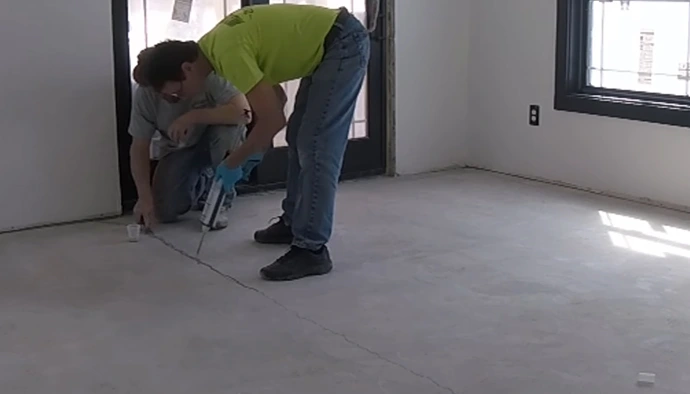Last Updated on June 20, 2023
When it comes to protecting your home from water damage, a good sealant is essential. And when it comes to concrete basement floors, there is no better sealant than Polyurethane.
Polyurethane is a synthetic resin that forms a protective film on the surface of the concrete, preventing water and other liquids from penetrating the concrete.
It also has excellent abrasion resistance and is resistant to UV light, making it ideal for use in basements.
Quick Selection Table of the Best Sealant For Concrete Basement Floors
Why Polyurethane Is The Best Sealant For Concrete Basement Floors
Polyurethane is a synthetic resin that forms a protective film on the surface of the concrete, preventing water and other liquids from penetrating the concrete.
It also has excellent abrasion resistance and is resistant to UV light, making it ideal for use in basements.
Here are few reasons why polyurethane is the best sealant for concrete basement floors:
Polyurethane Forms A Protective Film On The Surface Of The Concrete
This protective film prevents water and other liquids from penetrate the concrete, which helps to protect your home from water damage.
Polyurethane Is Resistant To Abrasion And UV Light
The abrasion resistance of polyurethane helps to extend the life of your concrete basement floors by protecting them from wear and tear. And because polyurethane is resistant to UV light, it won’t yellow or fade over time like some other sealants.
Polyurethane Is Easy To Apply
Unlike some other sealants, polyurethane is easy to apply and can be done so with just a brush or roller. No special equipment is required, which makes it a great DIY project for those looking to save money on their basement remodel.
Polyurethane Is Affordable
Polyurethane is an affordable option for those looking to seal their concrete basement floors. It can be purchased at most hardware stores or online retailers for a fraction of the cost of more expensive sealants.
Polyurethane Has A Long Shelf Life
When properly stored, polyurethane has a shelf life of up to 10 years. This makes it a great option for those who want to seal their concrete basement floors now but may not have the budget for a more expensive sealant right away.
Polyurethane Is Non-toxic
Although polyurethane emits VOCs (volatile organic compounds) when first applied, these VOCs dissipate quickly and are not harmful to humans or animals once they have dissipated.
In fact, polyurethane is actually less toxic than many other types of sealants on the market today.
Comparison Reviews on the Best Sealant For Concrete Basement Floors
How do You Choose the Best Sealant For Concrete Basement Floors
There are two main types of sealers: Penetrating sealers and surface sealers. Penetrating sealers seep into the pores of the concrete and form a barrier against moisture and stains. Surface sealers lay on top of the concrete and provide a barrier against wear and tear.
Each type of sealer has its own advantages and disadvantages.
Penetrating Sealers:
Advantages:
Repels water, oil, and other stains
Breathable, so it won’t trap moisture in the concrete
Enhances the natural color of the concrete
Won’t change the texture of the concrete
Long lasting
Disadvantages:
Can be difficult to apply evenly
Takes longer to dry
Can be damaged by deicing salts, so it’s not ideal for outdoor use
Surface Sealers:
Advantages:
Dries quickly
Easy to apply
Can be used on both indoor and outdoor surfaces
Comes in a variety of colors
Protects against wear and tear
Slip resistant
Can be easily removed if you want to change the color or finish
Disadvantages:
Will change the appearance of the concrete (i.e., it will be glossy)
Not breathable, so it can trapping moisture in the concrete which could lead to mold or mildew
Not as durable as penetrating sealers
When choosing a sealer for your basement floor, there are a few things you need to take into consideration.
First, what is the purpose of the room? If it’s going to be used as a storage space, then you’ll probably want a durable sealer like a penetrating sealer. But if it’s going to be used as a living space, then you might want a surface sealer that comes in a variety of colors.
Second, what is the condition of your concrete floor? If it’s new, then you might not need to sealed at all. But if it’s starting to show its age, then you’ll definitely want to use a sealer.
And, where is your basement located? If it’s underground or if there’s no way for water to escape, then you’ll want to use a waterproofing sealant like a surface sealer.
But if your basement is above ground or has good drainage, then you might not need a waterproofing sealant. In general, waterproofing sealants are more expensive than non-waterproofing ones.
So keep that in mind when making your decision. No matter what kind of basement floor sealer you choose, make sure you follow the manufacturer’s instructions carefully for best results.
How long does a typical sealant last on a concrete basement floor?
A typical sealant should last anywhere from 5-10 years, but it will depend on the specific type of sealant used, how well it was applied, and the condition of the concrete.
Sealing a concrete basement floor is an important step in preventing water damage and extending the life of the floor.
There are many different types of sealants available, so it’s important to select one that is best suited for the specific needs of your floor. Once the sealant has been applied, be sure to keep it clean and free from dirt and debris to ensure optimal performance.
Is it necessary to seal a concrete basement floor?
There is no one-size-fits-all answer to this question, as the necessary steps for sealing a concrete basement floor will vary depending on the specific circumstances.
However, in general, it is advisable to seal a concrete basement floor in order to protect it from moisture and water damage.
One of the main benefits of sealing a concrete basement floor is that it prevents moisture from seeping into the concrete and causing it to deteriorate over time.
Additionally, when a concrete basement floor is sealed, it becomes much easier to clean and maintain.
How can I tell if my concrete basement floor needs sealing?
A concrete basement floor should be sealed if it has a moisture problem or if it has been treated with a penetrating water repellent.
If there is a moisture problem, the concrete slab will be damp and may have a white or gray film on the surface.
Sealing the floor will help to prevent the moisture from entering the concrete and will also keep the dirt and dust from accumulating on the surface.
If the floor has been treated with a penetrating water repellent, you should still seal it with a coat of sealer. The water repellent will help to protect the concrete from water damage but it will not prevent moisture from entering through small cracks and pores in the slab.
Our Verdict
Polyurethane is the best sealant for concrete basement floors because it forms a protective film on the surface of the concrete, prevents water and other liquids from penetrating the concrete, has excellent abrasion resistance, and is resistant to UV light .
It is also easy to apply, affordable, and has a long shelf life . Plus, it is non-toxic once dry . If you are looking for a good sealant for your concrete basement floors , look no further than polyurethane !


